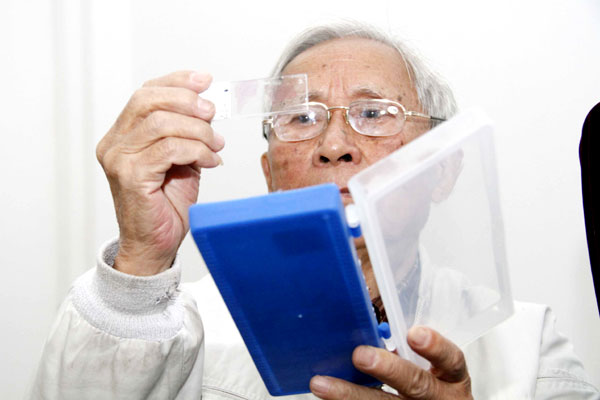Forensic anthropologist provides justice to the dead
Updated: 2012-11-20 10:29
By Cang Wei and Song Wenwei in Nanjing (China Daily)
|
|||||||||||
 |
|
At the age of 90, Zhou Xueliang still works at the Forensic Identification Center of Nanjing Medical University every day. Liu Li / for China Daily |
If Zhou Xueliang says he is the most experienced forensic anthropologist in Jiangsu's provincial capital of Nanjing, no one will dispute that.
Although he retired 24 years ago, the 90-year-old still goes to work every day by bus. He has a lab in the Forensic Identification Center under Nanjing Medical University. The lab is piled high with books and materials. On his desk sits a microscope that has helped him anatomize more than 1,000 bodies.
"I recognize more dead people than living ones," Zhou says with a smile.
It wasn't Zhou's first choice to be a forensic anthropologist. He entered medical school in 1946 to achieve his aspiration of becoming a doctor. But when he graduated in 1951, the university asked him to become a forensic assistant.
"I chose to study in a medical school to solve the problems of living people, not to spend time with the dead," Zhou says. But after some consideration, he agreed to accept the university's offer and worked hard to overcome his fear.
When he was an undergraduate, Zhou sometimes went looking for unidentified bodies in abandoned areas together with some male classmates.
"I've seen all types of corpses died of various reasons," Zhou says. "The most horrible bodies are those who died of drowning, with terribly swollen faces and stomachs."
Dissecting bodies is his core job. "Take the human brain, for example. The brain is as soft as fresh tofu, and thus, it's hard to cut. We need to add formaldehyde so that it will stiffen.
"But the career requires us to overcome our fears, and we got used to the bodies after awhile," Zhou says. "My nose is not sensitive to the smell of decomposed bodies now."
The man says his job is like a detective's. "A forensic anthropologist needs to combine professional knowledge with reality, such as the victim's health condition, the family background and the social network, to consolidate the conclusion of the anatomy."
Citing an example, Zhou says there was a case of a female teacher who died naked in Hunan province in February 2003, and the forensic department helped to solve the crime.
The local court first thought the woman died of acute cardiopulmonary failure. But after careful examination, Zhou and his colleagues found subcutaneous hemorrhaging in several parts of the body that were not easily touched. The court finally delivered the verdict that the boyfriend was 50 percent responsible for the death due to "improper behavior".
In another case, a man in his 30s died in his own apartment in Liyang of Jiangsu province, with his throat and sex organs cut open. Investigations by local police found that the man cheated on his wife and had a mistress.
"It was easy to draw the conclusion that the man was murdered," Zhou says. "But suicide and murder display differently - the directions, depth and places of the cuts, as well as the bleeding and the struggles were not the same. From the evidence collected, I concluded that the man committed suicide."
Because of Zhou's professionalism, he supervises his young colleagues in the forensic identification center, says Li Kai, one of the center's staff. "We usually ask Professor Zhou to check our anatomy reports before we release them. His opinions and suggestions are very helpful."
Zhou says although he's 90 years old, he is still constantly learning. "This is required by our career. We need to keep up to date with knowledge related to our work, such as brain surgery, gynecology and internal medicine."
A book titled Diagnostic Pathology in Zhou's office looks dirty and well-used, evidence that it is frequently used as a reference.
He volunteered to donate his body as early as 1998, together with his brother and sister-in-law, and says he is satisfied with his meaningful life.
Because forensic anthropologists' anatomy reports have considerable influence over the courts, people involved in the investigated cases visit Zhou from time to time.
He has been harassed and received threatening telephone calls in the middle of the night. But he says he has never once submitted to coercion or inducement.
"We must be just and objective," Zhou says.
"Doctors pay attention to efficacy, we pay attention to jurisprudence. Doctors give patients health, we give the dead justice."
Contact the writers through cangwei@chinadaily.com.cn.
Related Stories
Health insurance policy seen as essential to medical alliance 2012-11-08 09:31
Medical scans' hidden risks 2012-09-11 15:17
US FDA approves new medication to treat rare type of leukemia 2012-08-10 09:42
Qinghai benefits from medical system reform 2012-07-30 09:23
Titanium medical implants may corrode, cause inflammation: study 2012-07-26 10:06
Today's Top News
Rescuers race against time for quake victims
Telecom workers restore links
Coal mine blast kills 18 in Jilin
Intl scholarship puts China on the map
More bird flu patients discharged
Gold loses sheen, but still a safe bet
US 'turns blind eye to human rights'
Telecom workers restore links
Hot Topics
Lunar probe , China growth forecasts, Emission rules get tougher, China seen through 'colored lens', International board,
Editor's Picks

|

|

|

|

|

|





